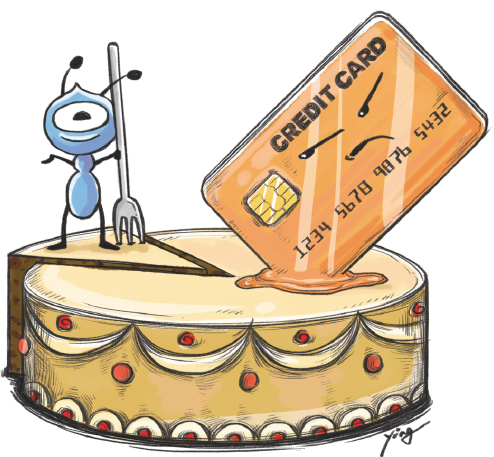
Plastic cards are slowly melting as internet-based lenders roll out red-hot online products for e-shoppers
Liu Wei, 23, a student from the China University of Political Science and Law, wanted to buy a new laptop but could not afford it. The monthly allowance of 1,600 yuan ($240) from her parents was just enough to cover only the living expenses.So, when Liu learned about a consumer finance service called Baitiao, she immediately applied online for credit.
Next, she produced her student ID card, regular ID card and bank debit card for verification by the lender's on-campus agent. In less than an hour, Liu was granted a credit of 5,000 yuan. There was no credit card, just direct credit into her bank account. Liu bought her favorite laptop in a jiffy.
Millions of Chinese consumers such as Liu, who had never used plastic cards to "buy first pay later", are now enjoying the convenience of easy digital-age credit.
China's e-commerce giants are exploiting big data and online technologies to offer credit to them, particularly younger e-shoppers like Liu.
This has created a new line of consumer finance business that is nibbling away at the edges of credit cards and driving card-issuers such as commercial banks crazy.
So much so that for the first time since 2008, the number of credit cards in use fell in 2015. China had 432 million credit cards in use last year, down 5 percent from 2014, according to the People's Bank of China.
Speaking anonymously, an official at a bank's credit card center said: "We have felt rising pressure from large internet companies like Alibaba Group Holding Ltd and Tencent Holdings Ltd as they have begun offering their own credit services to consumers."
Such online credit is offered via products like Ant Check Later of Ant Financial, an arm of Chinese e-commerce giant Alibaba.

Ant Check Later extends consumer credit ranging from 500 yuan ($75) to 50,000 yuan based on its own risk assessment of customers. Credit is interest-free for up to 41 days.
The product is accepted by more than 40 consumer-facing platforms, including major e-commerce players, online-to-offline or O2O services, and retailers of computers, communications equipment and consumer electronics.
Payments can be made in installments at three-, six-, nine- or 12-month intervals. Interest rates vary from 2.5 percent to 8.8 percent.
Young consumers, it appears, welcome such products. More so because traditional credit card issuers typically steer clear of them due to perceived high risk. More than 60 percent of Ant Check Later customers, it is said, have never used consumer financial services such as credit cards before.
It comes as little surprise then that 48.5 percent of Ant Check Later users were born in the 1980s; and 33 percent in the 1990s. The impact of this online credit product on middle- and low-income consumers is significant, industry experts said.
This has boosted the purchasing power of consumers who used to spend 1,000 yuan or less a month on average online. Now they spend 50 percent more or 1,500 yuan a month online, according to Ant Check Later data released in November 2015.
In a report published in June, GEO Technologies Ltd, a Beijing-based big data solutions provider, said: "Products like Ant Check Later have vitality. They are well received by a wide range of consumers because they offer small amounts of credit to grass-roots consumers on an unsecured basis without collateral."
If Alibaba has Ant Check Later, its rival JD.com has Baitiao, which offers credit of up to 15,000 yuan and delayed payment options for up to 30 days or repayment in installments.
Baitiao is under JD Finance, an arm of JD.com. Xu Ling, vice president of JD Finance, said: "Banks collect all kinds of customer information related to employment, income, property and vehicle ownership, to assess a customer's repayment capability. They even make on-phone enquiries. But we collect useful information automatically or through one-to-one interactions that are more personal."
Encouraged by the success of this method, JD Finance extended the Baitiao service to collegians, but with lower credit lines. In doing so, it filled a gap in the demand for, and supply of, consumer credit.
The gap arose because most banks would not issue credit cards to young students. Some lenders, hurt by a high rate of defaults among card-holding students, raised the threshold for obtaining plastic in the last few years.
As digital credit became popular, escalating competition with traditional lenders, China Merchants Bank Co Ltd and Bank of Communications Co Ltd hit back. Realizing that even digital credit providers relied on traditional banking channels to execute transactions, they stopped Baitiao from using their infrastructure in November 2015.
China Merchants Bank went so far as to call Baitiao a loan product. It further argued Baitiao's customers should repay using a debit card, not a credit card.
But Xu of JD Finance maintains Baitiao transactions appear as the company's accounts receivables, not loans, in financial statements.
All this had a positive impact on banks nevertheless. They started to pull up their credit socks and doubled efforts to recapture lost market share.
GEO Tech expects consumer finance will integrate deeply with the internet in the years to come. It said e-commerce giants enjoy advantages in the form of huge number of active users and humongous amount of data on their spending power, shopping habits, frequency of logins and changes in address, which will make risk assessment cheaper and more accurate.
A GEO report published in April found that during the first quarter of this year, 46.7 percent of an effective sample of more than 5 million credit card-holders also used Alipay, an online payment platform launched by Alibaba.
It revealed an increasingly clear trend of integration of mobile internet and consumer finance. The trend was not lost on banks. It drove them to launch cloud-based payment solutions. For instance, major commercial lenders such as Bank of China Ltd and China Construction Bank Corp jumped on the mobile payments bandwagon.
